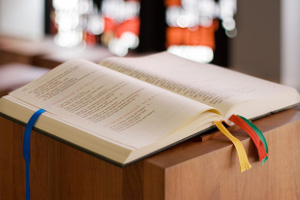 In the first four verses we hear the word ‘justice’ (mishpat) three times.
In the first four verses we hear the word ‘justice’ (mishpat) three times.
The coming of the servant is about bringing about what is right. This term, justice (mishpat), has a very broad meaning that has roots in legal and governmental decision making. It can be used in the context of jurisprudence or customs, sometimes it refers to consequences and punishment. In this text it is used in verse four to resonate with ‘teaching’ (torah).
The other words that are repeated in the first four verses of Isaiah 42 are the words for ‘bruised’ or ‘crushed’ and ‘dimly burning’ or ‘growing faint’. The justice of God’s Spirit-filled servant protects the bruised and dimly burning. At the same time the servant and the justice he (dare we think ‘she’?) brings is not going to be bruised or burn dimly. It seems odd this justice that will be established. It comes without a lot of noise.
Do we know examples of justice that come quietly? Do we know justice that is not crushing that does not snuff out all the light? So often bad behaviour finds its root in pain. This seems to be the kind of justice that heals perpetrator as well as victim, quietly. We, as Christians, recognise Jesus in this description. What would it take for people to recognise the church in this image?
8 January 2017
Isaiah 42:1-9
This weekly blog on one of the lectionary readings is by Anna-Claar Thomasson-Rosingh, Coordinator for the Centre for Encountering the Bible and Director of Studies for the Centre for Formation in Ministry.

Leave a Reply